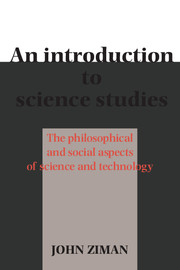Book contents
- Frontmatter
- Contents
- Preface
- 1 ‘Academic’ science
- 2 Research
- 3 Validity
- 4 Communication
- 5 Authority
- 6 Rules and norms
- 7 Change
- 8 The sociology of scientific knowledge
- 9 Science and technology
- 10 Pure and applied science
- 11 Collectivized science
- 12 R & D organizations
- 13 The economics of research
- 14 Science and the State
- 15 The scientist in society
- 16 Science as a cultural resource
- Index
12 - R & D organizations
Published online by Cambridge University Press: 05 August 2012
- Frontmatter
- Contents
- Preface
- 1 ‘Academic’ science
- 2 Research
- 3 Validity
- 4 Communication
- 5 Authority
- 6 Rules and norms
- 7 Change
- 8 The sociology of scientific knowledge
- 9 Science and technology
- 10 Pure and applied science
- 11 Collectivized science
- 12 R & D organizations
- 13 The economics of research
- 14 Science and the State
- 15 The scientist in society
- 16 Science as a cultural resource
- Index
Summary
‘In modern science the era of the primitive church is passing, and the era of the Bishop is upon us. Indeed the heads of great laboratories are very much like Bishops, with their association with the powerful in all walks of life, and the dangers they incur of the carnal sins of pride and lust for power.’
John von NeumannScience as an instrument of policy
As we have already remarked (§9.1), to the eyes of the general public, science is simply one of the components of ‘science and technology’, which is primarily an instrument in the hands of society. This instrument can be used to do whatever society wants, over a very wide range. These wants are impossible to list in full, and have very varied sources of motivation, such as:
Meeting basic human needs, in the form of food, shelter and health
Making war, or otherwise serving the purposes of the nation-state
Making profits for competitive industry, through technological innovation
Improving the quality of life, by eliminating human drudgery and environmental pollution
Solving social problems, such as overpopulation and economic underdevelopment.
In the past half century, the vague Victorian belief in science as a source of ‘progress’ has been transformed into an established doctrine.
Information
- Type
- Chapter
- Information
- An Introduction to Science StudiesThe Philosophical and Social Aspects of Science and Technology, pp. 140 - 148Publisher: Cambridge University PressPrint publication year: 1984
